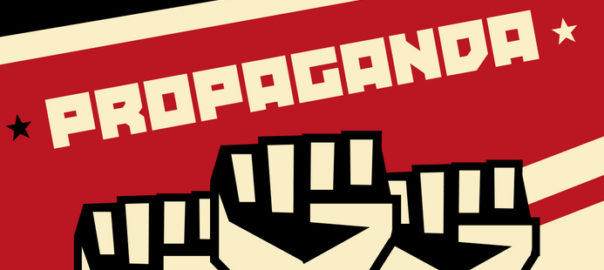
In my writing, I aim for civil, principled conversation across ideological, political, and religious boundaries, respecting differences and aiming for consensus where possible. I am grateful for the many who join me (often with far greater eloquence and influence) in such peacemaking. But I would be remiss not to expose two tactics of the enemies of freedom: projection and subversion. These are the twin towers of agitation propaganda (known as “agitprop”) and have flourished for a century in communist and fascist societies. (One note here: the extreme Left (communist) and extreme Right (fascist) differ in some particulars but share similar roots of totalitarian control over people and societies, along with philosophies favoring particular groups [Party members or a particular race] over others.)
Projection is when one group accuses another of the very actions they are doing themselves. For example, a group of students, in the name of freedom and safety, calls for the firing of a professor that disagrees with their philosophies. Another form of projection is deflection: when individuals or groups ignore difficult questions and merely repeat their slogans. For example, a pro-choice activist was asked what she thought of recent remarks by her governor concerning his support of late term abortion and even infanticide (“Make the baby comfortable while the mother and physician decide what is best.”). Rather than answering with revulsion, support, or even a nuanced middle ground, the activist just shouted, “You want to deprive women of their access to healthcare and return to the days of the coat hanger.” This happened four times as the question was repeated. Religious adherents are declared intolerant when they refuse to support alternative lifestyles contrary to their tradition. This is projection – for the accuser is her or himself intolerant of the religious point of view (or wants it confined to private spaces!).
Subversion appears as the true agendas of groups are revealed. White nationalists and Nation of Islam adherents want to subvert the Bible, the Constitution, and a positive history of improving race relations and create completely segregated nations. Many Marxists are happy to use capitalistic and democratic means to achieve communalistic and undemocratic ends. They also combine projection and subversion when they accuse some of their own of not being revolutionary enough! Such was the case in the French, Russian and Chinese revolutions, where millions died for not being radical enough. Think about these historical illustrations:
- The Nazis burn the Reichstag (parliament) building, blame the communists, and use it as an excuse to kill and imprison thousands (projection and subversion).
- Lenin spoke of his need for capitalistic “useful idiots” to fund his revolution (subversion).
- Closer to home, “Rules for Radicals” author Saul Alinsky advocates to creating chaos and dissatisfaction (subversion) and making sure no other peaceful solutions get in the way the radical agenda.
- Radical Islam promotes deception and temporary truces with opponents as part of the long play for domination (subversion). Anyone who does not honor their Prophet is pronounced a blasphemer and subject to severe penalty, even as they claim victimhood status (projection).
- And today, several extremist groups in the USA are calling for an end to nuclear family, and end to free enterprise, and overturning particular religious influences (subversion), as well as declaring all their opponents’ oppressors (projection).
May we examine our hearts and choose advocacy over mere accusation and acceptance of complexity over childishness. Let’s keep projection and subversion far away as we pursue peace and justice.



